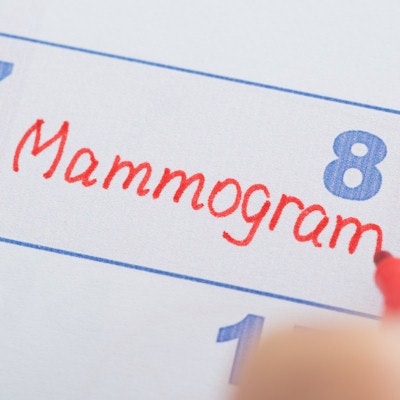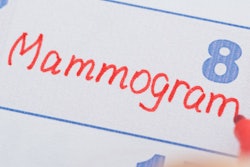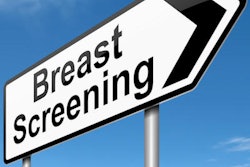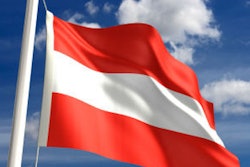
Why do some women pursue opportunistic breast screening when they aren't yet eligible for an organized mammography program? High levels of fear and perceived susceptibility to breast cancer are among the most-cited reasons, according to the results of a survey published on 21 March in BMC Cancer.
Swiss women ages 30 to 49 completed a cross-sectional online survey, unveiling their reasons for opportunistic mammograms. The survey was led by Nanon Labrie, PhD, from the medical psychology department at the Academic Medical Center, University of Amsterdam, in the Netherlands (BMC Cancer, 21 March 2017).
"The present study demonstrates that young women are indeed inherently different from women who are eligible for screening in terms of what drives their mammography behaviors," she and her colleagues wrote. "Among young women, breast cancer fear, perceived susceptibility, and mammography involvement were found to be the main predictors of screening intentions."
Much confusion, less consensus
Much confusion exists as to when women should start mammography screening. Not only do scientific studies lack consensus, but different countries and regulatory bodies advocate various ages, further muddying the waters. In the U.S., the U.S. Preventive Services Task Force (USPSTF) advises women to start screening at age 50, while the American Cancer Society recommends starting at age 45.
In Europe, many countries advise starting screening at age 50; however, some also have their own guidelines and, like in Switzerland, programs are organized regionally.
"Recent studies suggest that, in the face of conflicting research evidence and diverging recommendations, young women (30 to 49) often do not accept the lower age thresholds for screening and advocate their right to be included in organized screening programs," the authors wrote. "In fact, many young women already engage in opportunistic screening."
The Swiss Federal Statistical Office reports that 44% of women ages 40 to 49 have undergone at least one mammogram, almost half of them in the past two years. There are many reasons why this may be the case -- women may not be aware of the lower age thresholds, or media coverage may stir anxiety.
"To date, relatively little research has been done to investigate the precise motivations underlying young women's intentions to go for mammographic screening prior to program eligibility," according to the authors. "Yet, such research is crucial when striving, on the one hand, to enforce policy decisions concerning the age thresholds for systematic screening programs and, on the other hand, to allow young women to make evidence-based, informed decisions about mammography, both now and in the future."
Survey says ...
In January 2015, a cross-sectional survey was conducted across all Swiss cantons (a country subdivision) among a sample of 918 Swiss female residents ages 30 to 49. The response rate was relatively low (16.5%) and the drop-out rate was high (26.25%), quite likely due to survey length and sensitivity of the topic.
The intention to have a mammogram was measured in two ways. First, participants were asked to respond to the statement, "I intend to have (another) screening mammogram to check for breast cancer in the near future," using a five-point Likert scale (strongly disagree to strongly agree), adding the option, "I have not yet thought about this." Unless participants chose the last option, they were asked at what age -- provided their health status would remain the same -- they would consider having another mammogram.
Participants were on average 39.37 years old and 82.4% indicated Swiss nationality. Overall, 59.9% of participants hailed from the German-speaking region of Switzerland, 29.8% from the French-speaking region, and 10.2% from the Italian-speaking region. In terms of screening availability, 52.18% lived in a canton that offered a systematic screening program at the time of the survey while 47.82% lived in a canton offering opportunistic screening.
On average, women answered 70.8% of the knowledge questions about breast cancer and mammography screening correctly. Close examination of the individual items revealed that while participants performed well on most questions, some questions elicited more erroneous than correct responses, particularly questions pertaining to the risk factors for developing breast cancer.
Overall, participants displayed a lack of knowledge of known risk factors, such as being overweight (54.1%), living in a Western country (56.3%), and age. Specifically, 57.3% did not know breast cancer is more prevalent in women age 65 than 40.
"This latter finding was emphasized by the result that 42.1% of participants thought that women over 70 rarely develop breast cancer," the authors wrote.
Lastly, participants were unaware of the age thresholds for organized screening in Switzerland: The majority of participants (64.1%) answered that Swiss programs invite women from the age of 40 onward. At the same time, participants appeared fearful of breast cancer and overestimated their risk of getting it: On average, participants scored a 23.41 on the breast cancer fear scale, with scores ranging from 8 to 40.
Perception is everything
Overall, 13.7% of the participants were characterized by low levels of fear (score of less than 15), 30.2% by moderate levels (score of 16 to 23), and 56% by high levels (greater than 24). When asked about their personal risk of developing breast cancer, participants on average estimated it to be 20.45% (range, 0 to 100), equivalent to a chance of 1 in 4.89. Participants' self-perceived susceptibility to get breast cancer, however, was relatively low, with a mean score of 2.24 (range, 1 to 5).
When asked to respond to the statement, "I intend to go for mammography screening in the near future," 87 participants indicated they hadn't thought about it yet. Among those who responded to the statement, 44.2% (strongly) disagreed, 21.2% neither agreed nor disagreed, and 34.5% (strongly) agreed. On average, these respondents scored a 2.90 (range, 1 to 5). When asked at what age they intend to have their (next) screening mammogram, 272 women (35.2%) answered they do not plan to have a mammogram at all. The remaining women indicated an average age for a (next) mammogram of 45.50, with a mode of 50.
In total, 56.7% of respondents indicated the intention to have (another) screening mammogram under the age of 50, below the lower age threshold for systematic screening in Switzerland (9.6% indicated an age below 40, 24.4% said 40 to 44, and 22.8% answered 45 to 49). In the Swiss-Italian region, the indicated average age was 44.10; in the Swiss-German region it was 45.62; and in the Swiss-French region it was 45.84.
"Participants who perceived themselves as fearful and highly susceptible to breast cancer judged mammography as more relevant to them personally and, thus, had a more positive attitude toward screening," the authors wrote. "The results show an association between participants' involvement, fear, and perceived susceptibility, and their intention to engage in screening in the near future."
To successfully promote adherence to screening guidelines in the future, different public health communication strategies must be developed for women of different age groups, according to Labrie and colleagues. Efforts should be directed toward informing young women about the correct age thresholds for mammography, correcting their erroneous beliefs about breast cancer and screening, and reducing excess levels of fear and involvement.
"Overall, the findings suggest that, rather than a rational and knowledge-oriented approach, a targeted approach that takes young women's underlying motivational orientation and psychological distance into account, could be promising when designing interventions to justify and promote public health decisions concerning the age thresholds for mammography," they concluded.



















